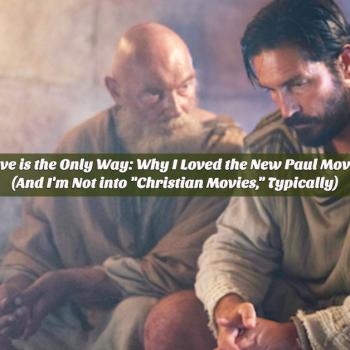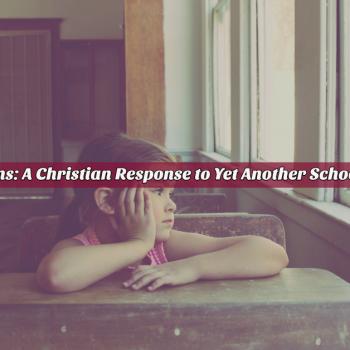It’s no secret that I have advocated that the church stay out of marriage (in regards to imposing a “Christianized” version on the government). There should be no qualms about allowing people who love each other to marry one another under the law, especially when a marriage is ratified by a pagan state. This has no effect on Christians of either persuasion – those that are progressive (who affirm LGBTQ covenantal unions as blessed by God, based on their reading of the New Testament) and traditionalists (those who, at their best, love LGBTQ folks but may not affirm sexual relationships for biblical reasons) – as marriage should be a sacred act, primarily, and not a legislative one. No matter one’s theology, the culture war is quite unnecessary.
In other words, no one is stepping into a conservative Christian church and forcing the ministers to perform marriages that go against their conscience. This is about hospitality and not imposing a version of the Christian will on people who differ.
In the past, I’ve suggested that perhaps a solid solution to this issue would be “civil unions for all” and allowing those civil unions to be ratified by religious congregations as each tradition sees fit. Given that my solution isn’t where we find ourselves at the moment, I hope more states will move toward marriage equality (for the sake of my neighbors, not because I’m passionate about being invested in U.S. politics). Unfortunately, this debate continues to spark fires that I see as unnecessary, at least as one who is postured within the Christian tradition. We ought to bear with one another and love one another, even when we disagree.
Chick Fil A Drama and My Silence
Last year, when all of the drama around Chick-fil-A was being publicized, I stayed silent. No longer, as blogger (etc.), is my first impulse to say my piece about every little online quibble that emerges. I’m finding it a good practice to keep my keystrokes silent. I don’t always have to get in my virtual jab.
At the time, I was embarrassed to see conservative Christian people (not)representing Jesus through blatant childish put-downs and ridiculous campaigns for a company that they identified as “Christian.” Free speech is fine, but we have to understand that the LGBTQ community has endured their fair share of oppression and hatred. All that I saw coming from segments of the “Christian right” was more of the same – an attitude of superiority and entitlement.
I do not speak for the gay community, so I will simply say that I was saddened to see what I perceived as hatred (at times) on the other end of the spectrum (including straight advocates). Even so, my sympathies lie with the gay community in this situation as they are the ones who have been forced into the margins for generations. All of that to say, I was humiliated by the public face of Christianity during those few weeks, and I think that there are parts of the opposite opinion that could have been expressed with greater generosity. Both sides lived a narrative of “culture war,” and I’m tired of living in that story.
The Dehumanizing Power of the Web
The power of the Internet is a wonderful thing at times. However, at other times that power is the very source that causes further segmentation. We can put an web meme up, and now our holy opinion has been stated for the world to see. And then, the other persuasion can put up their political cartoon. This back-and-forth vitriol hardly leads to productive dialogue. That isn’t to say that there’s never a moment to name convictions or to speak the truth in love. But, there are times in which we dehumanize the “other side” of the spectrum by using internet labels rather than inviting them over for dinner to learn from them (whoever “them” may be). As a result, much of what I see during online controversies, like the LGBTQ vs. Chick Fil A issue, tends to look more like dehumanization (which is evil) than humanization (which is the way of Jesus – the fully Human One).
When the controversy broke, I didn’t find value in violent speech and detached conversation (yelling). I still don’t. Therefore, I stayed silent on the web.
Until now. Why? Because the sort of thing that should drive difficult questions within a pluralistic culture actually happend and is now public knowledge. Although I missed it when it came out about a year ago, a hopeful article inspired me today. While certain Christians were acting out of a posture of pride and anger, and while certain segments of the LGBTQ community were doing their fair share of protesting, Dan Cathy (Chick Fil A) and activist Shane Windmeyer (Campus Pride) were learning to care for each other! These sorts of stories of healing, hospitality, and reconciliation are only possible when we put a human face on the person we’ve objectified as the “other” or “enemy.” Jesus’ words come to mind: “Love your enemies…”
According to Shane Windmeyer:
On Aug. 10, 2012, in the heat of the controversy, I got a surprise call from Dan Cathy. He had gotten my cell phone number from a mutual business contact serving campus groups. I took the call with great caution. He was going to tear me apart, right? Give me a piece of his mind? Turn his lawyers on me?
The first call lasted over an hour, and the private conversation led to more calls the next week and the week after….
His questions and a series of deeper conversations ultimately led to a number of in-person meetings with Dan and representatives from Chick-fil-A. He had never before had such dialogue with any member of the LGBT community. It was awkward at times but always genuine and kind.
Remarkable! Secretly, Dan Cathy and Shane Windmeyer were hanging out during all of the drama. Not compromising their values, but exemplifying a shared value – hospitality.
The Reconciling Power of Hospitality
The internet continues to create spaces of hospitality (I’ve made many friendships through blogging, Twitter, and Facebook – for instance), but also makes it much easier to talk about someone in a way that one would never do if sitting over coffee (at least, for the most part). As this story of reconciliation demonstrates, much can be accomplished when two human people begin a very human relationship. No longer are we yelling at a screen (if we so choose) but we are yelling at a person. Seeing the face of your enemy changes things. At times, this is enough for an enemy to become an acquaintance and even a friend. This was true for Cathy and Windmeyer:
Through all this, Dan and I shared respectful, enduring communication and built trust. His demeanor has always been one of kindness and openness. Even when I continued to directly question his public actions and the funding decisions, Dan embraced the opportunity to have dialogue and hear my perspective. He and I were committed to a better understanding of one another. Our mutual hope was to find common ground if possible, and to build respect no matter what. We learned about each other as people with opposing views, not as opposing people [empahsis mine].
Clearly Cathy and Windmeyer share a different vision of sexual morality, but they serve as examples of why that doesn’t trump friendship and common human experiences! People of different persuasions have something to learn from each other – something that is difficult to learn behind the malicious claims and insults of the computer screen. We need only to hear how Windmeyer ends his excellent article to catch a better vision for dealing with culturally sensitive issues:
…after discussions with Dan and Chick-fil-A, Campus Pride suspended our campaign. Like Dan, we had faith. It took time to be proven publicly.
Now it is all about the future, one defined, let’s hope, by continued mutual respect. I will not change my views, and Dan will likely not change his, but we can continue to listen, learn and appreciate “the blessing of growth” that happens when we know each other better. I hope that our nation’s political leaders and campus leaders might do the same.
In the end, it is not about eating (or eating a certain chicken sandwich). It is about sitting down at a table together and sharing our views as human beings, engaged in real, respectful, civil dialogue. Dan would probably call this act the biblical definition of hospitality. I would call it human decency. So long as we are all at the same table and talking, does it matter what we call it or what we eat?
Sitting at the Table Together
What would it look like for Christians of all persuasions to learn from each other and from the good folks in the LGBTQ community? Every situation will be different. But, I have a feeling that a meal might help. Or perhaps, what might help is the assumption behind the meal: you and I belong together, not divided.
The beauty of hospitality is that it doesn’t mean compromising one’s beliefs (in every case), but it means learning to love and respect people no matter their beliefs. This is foundational for the Christian life. Jesus, who taught us to “love our enemies” also invites us to uphold two great commandments: love for God and love for neighbor. Perhaps with this posture, we will move beyond web controversy and begin to see authentic human image-bearers, all for whom Christ died.












